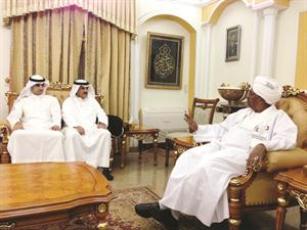Bashir discusses investment difficulties with Zain Telecom directors
February 18, 2013 (KHARTOUM) – The Sudanese president Omer Hassan al-Bashir met on Wednesday with several members of Zain Telecom’s board of directors for discussions that focused on difficulties facing their investments in the country.
 The Kuwait-based Al-Anba daily said that Zain was represented by Assad al-Banwan who serves as the Non-Executive Chairman of the Board of Mobile Telecommunications Co KSC (Zain), Deputy Chairman Abdul Aziz Al Nafisi along with Board members Bader Nasser Al-Kharafi and Jamal Al Kandary.
The Kuwait-based Al-Anba daily said that Zain was represented by Assad al-Banwan who serves as the Non-Executive Chairman of the Board of Mobile Telecommunications Co KSC (Zain), Deputy Chairman Abdul Aziz Al Nafisi along with Board members Bader Nasser Al-Kharafi and Jamal Al Kandary.
The newspaper said that Zain’s delegation briefed Bashir on the status of their investments in Sudan and ways to remove obstacles preventing its growth. They however, expressed their understanding of the economic situation facing Sudan and the ability of the government to overcome it.
Bashir on his end expressed appreciation for Kuwaiti investments in his country and pledged to overcome all impediments facing it.
In recent years Zain began experiencing an unfavorable business climate caused by the erosion in the value of the local currency against the dollar and move by the government to raise sales taxes on telecom companies to 30 percent from 20 percent and a profit tax to 30 percent from 15 percent.
Furthermore, Sudan’s central bank prohibits foreign companies from repatriating their profits abroad and in the case of Zain this has been ongoing for several years.
Sudan is in the midst of an economic crisis resulting from South Sudan’s independence in July 2011. The newborn nation contained 75% of the oil wealth that existed under the formerly-united country.
South Sudan’s oil production represented more than a third of Khartoum’s revenues and its largest source of hard currency, leaving the government struggling for alternatives since the South’s independence.
Last June, the government devalued the official foreign exchange rate as part of measures to compensate for the loss of South Sudanese oil.
It also raised taxes, allocated more funds for social spending and increased the pump prices of fuel by about 50 percent to reduce petroleum subsidies.
(ST)
